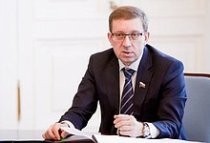Ru
|
Eng
Expert: Cost effectiveness of Russia’s latest nuclear power-generating unit will be 50-100% above competition
03.03.2017

One of the key events in the nuclear energy industry of Russia and the world happened at the Novovoronezh nuclear power plant — the first power-generating unit of Novovoronezh nuclear power plant No.2 (the sixth one of the Novovoronezh nuclear power plant) featuring a 3+ generation VVER-1200 reactor was commissioned. Director General of the Russian nuclear energy concern Rosenergoatom Andrei Petrov signed the relevant executive order on 27 February upon receiving the relevant approval from the parent company — the Russian state corporation Rosatom. Prior to that the Federal Environmental, Industrial and Nuclear Supervision Service of Russia (Rostechnadzor) concluded that the power-generating unit was compliant with the design documents, technical regulations, statutory and regulatory enactments, including those that specify energy efficiency requirements.
Alexei Mayorov, First Deputy Chairman of the Economic Policy Committee of the Federation Council, believes that the cost effectiveness of the new power-generating unit will be at least 50-100% above that of domestic and foreign analogs, BelTA has learned. The new unit boasts increased output in comparison with similar units that feature VVER-1000 reactors in addition to increased automation, which has reduced manpower requirements by some 30%. The most important thing is that the service life of the primary equipment has been doubled. The service life of irremovable equipment in the previous generation of power-generating units, for instance, the reactor pressure vessel, is 30 years. The service life of the new power-generating unit is expected to reach 45-60 years. The new unit is guaranteed to work for 60 years. Another 20-30 years can be added on top of that if the equipment is in good condition after the guaranteed service life period. As a result, the new unit can last for nearly 100 years. It is a very long period for any source of energy.
The impressive cost effectiveness was not achieved by cutting corners as far as safety parameters are concerned. Nobody is surprised by a large number of safeguards these days. It is exhilarating that after the Fukushima events passive safeguards that can work without power and without human interference are now more highly prioritized. Great progress in developing such systems has been secured recently not only in Russia but abroad, too. It is remarkable that some of the safeguards represent Russian know-hows such as the core catcher, which give Russian nuclear power plant designs a competitive advantage and represent an undoubtable benefit that helps Rosatom win so many orders for building nuclear power plants abroad.
ANALYTICS
30.08.2023
21.03.2023
30.08.2021
02.07.2021
23.06.2021
10.06.2021
04.06.2021
03.06.2021
20.05.2021
15.05.2021













